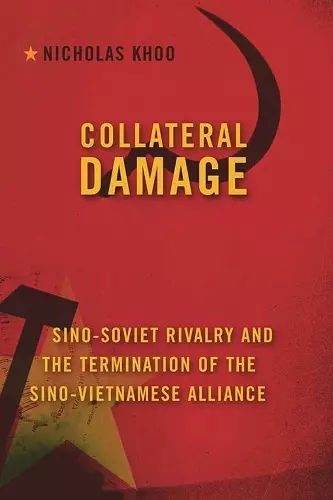Collateral Damage
Sino-Soviet Rivalry and the Termination of the Sino-Vietnamese Alliance
Format:Hardback
Publisher:Columbia University Press
Published:26th Apr '11
Currently unavailable, and unfortunately no date known when it will be back

"This book offers both a sophisticated analytical treatment and a comprehensive history of Sino-Vietnamese relations in the 1960s and 1970s, thus presenting a persuasive explanation of the emergence of Sino-Vietnamese friction in the 1960s and the emergence of Sino-Vietnamese animosity and war in the 1970s." -- Robert S. Ross, Professor of Political Science at Boston College, "Khoo returns to the roots of international relations theory to explain Chinese, Soviet, and Vietnamese behavior toward one another during the 1960s and 1970s on the basis of realist factors of power distribution and balancing. He uses new information released in China in the form of memoirs, scholarly works, and archival publications to tell a dramatic and in some ways tragic story with insight and vividness." -- Andrew J. Nathan, Columbia University
Although the Chinese and the Vietnamese were Cold War allies in wars against the French and the Americans, their alliance collapsed and they ultimately fought a war against each other in 1979. More than thirty years later the fundamental cause of the alliance's termination remains contested among historians, international relations theorists, and Asian studies specialists. Nicholas Khoo brings fresh perspective to this debate. Using Chinese-language materials released since the end of the Cold War, Khoo revises existing explanations for the termination of China's alliance with Vietnam, arguing that Vietnamese cooperation with China's Cold War adversary, the Soviet Union, was the necessary and sufficient cause for the alliance's termination. He finds alternative explanations to be less persuasive. These emphasize nonmaterial causes, such as ideology and culture, or reference issues within the Sino-Vietnamese relationship, such as land and border disputes, Vietnam's treatment of its ethnic Chinese minority, and Vietnam's attempt to establish a sphere of influence over Cambodia and Laos. Khoo also adds to the debate over the relevance of realist theory in interpreting China's international behavior during both the Cold War and post-Cold War eras. While others see China as a social state driven by nonmaterial processes, Khoo makes the case for viewing China as a quintessential neorealist state. From this perspective, the focus of neorealist theory on security threats from materially stronger powers explains China's foreign policy not only toward the Soviet Union but also in relation to its Vietnamese allies.
Collateral Damage offers both a sophisticated analytical treatment and a comprehensive history of Sino-Vietnamese relations in the 1960s and 1970s, thus presenting a persuasive explanation of the emergence of Sino-Vietnamese friction in the 1960s and the emergence of Sino-Vietnamese animosity and war in the 1970s. -- Robert S. Ross, professor of political science, Boston College Nicholas Khoo returns to the roots of international relations theory to explain how the Chinese, Soviet, and Vietnamese behavior toward one another during the 1960s and 1970s because of their relative power. He uses new information released in China in the form of memoirs, scholarly works, and archival publications to tell a dramatic and in some ways tragic story with insight and vividness. -- Andrew J. Nathan, Class of 1919 Professor of Political Science, Columbia University Nicholas Khoo has performed a great service in offering a cogent and persuasive argument on the causes of the demise of the Sino-Vietnames alliance during the later decades of the Cold War. -- Robert Sutter H-Diplo Roundtable
ISBN: 9780231150781
Dimensions: unknown
Weight: unknown
280 pages